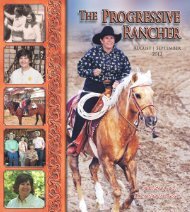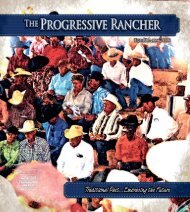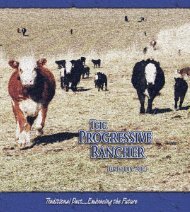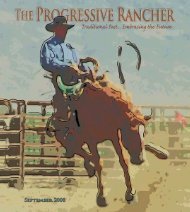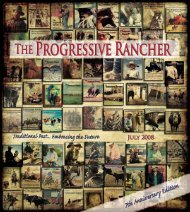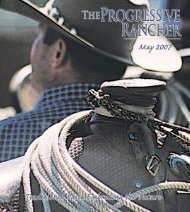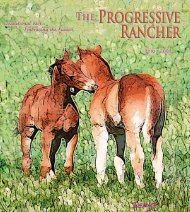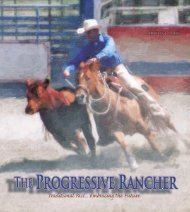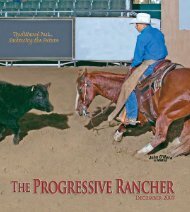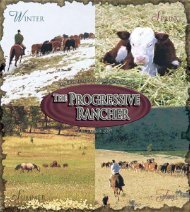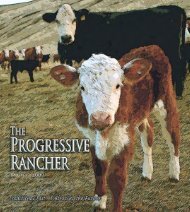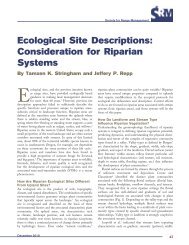fallon Bull Sale - The Progressive Rancher Magazine
fallon Bull Sale - The Progressive Rancher Magazine
fallon Bull Sale - The Progressive Rancher Magazine
You also want an ePaper? Increase the reach of your titles
YUMPU automatically turns print PDFs into web optimized ePapers that Google loves.
In<br />
this<br />
Issue...<br />
Nevada Cattlemen’s<br />
Association.......................pgs. 3-4<br />
Cow Camp Chatter, ..............pg. 5<br />
Eye on the Outside................pg. 6<br />
Leveling the Playing Field....pg. 8<br />
Horse Snorts and<br />
Cow Bawls.............................pg. 9<br />
Fumes from the Farm..........pg. 13<br />
Look Up...............................pg. 14<br />
Beef Check-Off...................pg. 16<br />
<strong>The</strong> Secret World<br />
Inside the Animal Rights<br />
Agenda, part 2..............pgs. 18-24<br />
Range Plants<br />
for the <strong>Rancher</strong>....................pg. 26<br />
Coloring Contest..................pg. 27<br />
Farm Bureau........................pg. 29<br />
HERDA................................pg. 31<br />
Edward Jones.......................pg. 31<br />
Behind the<br />
Summit Headlines...............pg. 34<br />
Dr. Margaret<br />
Winsryg, Ph.D.....................pg. 35<br />
In January I attended the Summit Of<br />
<strong>The</strong> Horse conference in Las Vegas.<br />
This was the first real attempt to organize<br />
together men and women from federal, state,<br />
tribal, and private land resource managers,<br />
conservationists and ranchers in a forum to<br />
address the growing problem of excess and unwanted<br />
horses, both domestic and wild.<br />
In many countries around the world, like the<br />
European Union, Soviet Republic, and even our<br />
neighbors in Canada, consumption of horse meat<br />
is common. I was told by one of the Canadians<br />
that attended the summit that horse meat is available<br />
in many of the supermarkets there. <strong>The</strong> majority<br />
of the population in the United States may<br />
not eat horse meat, and I say the majority because<br />
I personally know some people that actually do<br />
eat it and have talked to others that have tried it.<br />
In 2007 the last equine processing plant<br />
closed in the United States. <strong>The</strong> result of this<br />
was a total collapse in the price of “chicken feed<br />
horses” as they were often referred to. Any and all<br />
horses destined for slaughter must now be trucked<br />
either to Mexico or Canada. Now the government<br />
didn’t actually shut down the processing plants.<br />
What they did was cut off the funding for USDA<br />
inspectors at these plants, and without a meat<br />
inspection system we could no longer export the<br />
meat. I’m certainly not an expert on foreign trade,<br />
but the question I’d like answered is, if a country<br />
is wanting horse meat for human consumption,<br />
then shouldn’t they be able or allowed to provide<br />
their own inspectors in U. S. slaughter plants?<br />
After all, they are the ones that need to be satisfied<br />
and confident in the product.<br />
<strong>The</strong>re were a few individuals at the Summit<br />
that opposed horse slaughter. Most were wild<br />
horse advocates and others were with horse rescue<br />
groups. Horse rescue groups take in horses for<br />
a number of reasons, one of which is to save them<br />
from starvation. <strong>The</strong>y accept horses from owners<br />
who can no longer afford to buy the hay to feed<br />
them, but their main focus is to prevent the horses<br />
from going to slaughter. Most of these horse<br />
rescue groups are foundations that operate on<br />
donations which pay for the facilities and the feed.<br />
I feel that as long as they can properly feed and<br />
care for these horses then more power to them;<br />
in fact I’ve got a few old retired ranch horses I’d<br />
like them to rescue. <strong>The</strong> wild horse advocates also<br />
want to save horses from slaughter, especially the<br />
feral ones. <strong>The</strong> difference is they want you and<br />
me and every taxpaying American to foot the bill.<br />
In my opinion, if you call yourself a horse<br />
advocate that should mean you want what is best<br />
for the horse at heart. If processing plants were<br />
in the United States we could at least make<br />
sure horses were treated as humanely as<br />
possible. Horse advocates say they are opposed<br />
to slaughter because it is cruel and<br />
the thought of people eating horse meat is<br />
gross and disgusting. Let’s set aside the<br />
fact for now that people in many countries<br />
around the world enjoy eating horse meat,<br />
in fact some consider it a delicacy, and concentrate<br />
on the cruelty part. Those of us that<br />
spend our lives working with Mother Nature<br />
on a daily basis know that she can be a pretty<br />
cruel sometimes. I would like to share a story that<br />
a lot of you that read this column will relate to. I<br />
had a horse and his name was Pedro. All three of<br />
my children learned to ride on him. He was honest,<br />
careful and basically could be trusted with<br />
their lives. When he got to be about 30 years old<br />
arthritis set in and he would get pretty thin in the<br />
winter time like most old horses do. I couldn’t<br />
bring myself to send him off to the glue factory<br />
and I certainly couldn’t shoot him, so I thought<br />
I’d let him hang around until he died. I went out<br />
one winter morning, it was about 10 below, and<br />
I found Pedro lying on his side. He wasn’t dead<br />
yet but the birds had pecked his eye out and the<br />
coyotes had begun feeding on his back end. Of<br />
course I went to the house, came back and put<br />
him out of his misery. From that day on I swore<br />
I would never do that to one of my horses again.<br />
Unwanted and excess horses are a growing<br />
problem and we have got to start looking at this<br />
realistically. I don’t know exactly how many<br />
horses there are in the United States but I do know<br />
we are talking in the millions. <strong>The</strong>se millions of<br />
horses are all going to die someday. What do we<br />
intend on doing with all the carcasses? Are we<br />
going to put them all in landfills? Can we afford<br />
to cremate them all?<br />
Those that have made it their cause in life<br />
to make this into an emotional issue, and have<br />
convinced an unwitting public that horses are<br />
pets and not livestock, need to come up with some<br />
answers to these questions.<br />
Talking about equine slaughter makes people<br />
cringe, especially lawmakers, but people<br />
need to come back to the real world. It will take<br />
a coalition of various groups like horse associations,<br />
livestock groups, breed associations, racing<br />
associations, etc. to get the message out to the<br />
public and to Congress.<br />
<strong>The</strong> pessimist complains about the<br />
wind; the optimist expects it to change;<br />
the realist adjusts the sails.<br />
– William Arthur Ward<br />
UPDATE<br />
Ron<br />
Cerri<br />
Nevada<br />
Cattlemen’s<br />
Association<br />
President<br />
www.progressiverancher.com <strong>The</strong> <strong>Progressive</strong> <strong>Rancher</strong><br />
February 2011 3



